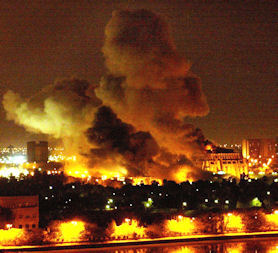Iraq inquiry: in search of the pro-war voices
As Sir John Chilcot continues his inquiry into the Iraq conflict, Channel 4 News discovers pro-war voices are becoming hard to find.

It is increasingly difficult to find people who were pro-Iraq war in 2003 and remain so today. MPs who voted for the war declined to comment to Channel 4 News online and figures in the arts world, previously outspoken in favour of removing Saddam, were conspicuously quiet.
The former prime minister has said the “threat to the region” posed by Saddam Hussein was enough to convince him it was right to attack, and that he stands by his decision.
Mr Blair’s opponents say the absence of weapons of mass destruction – the primary reason for the invasion at the time – critically undermine that stance.
So was “regime change” a worthy aspiration or a motive made valid in hindsight? Channel 4 News online has tracked down three supporters of the Iraq war for their 2009 view of the conflict and the inquiry.
Ann Widdecombe: pro-war Conservative
Ann Widdecombe has been in parliament for 20 years but will step down as MP for Maidstone and the Weald at the next election. She is known as a maverick politician who does not “tow the party line”. She voted strongly in favour of the Iraq war and later for an investigation into it.
She said: “I’m not sure that I’m expecting it [the Chilcot inquiry] to achieve a great deal. We’ve had Butler and Hutton already – so I’m not expecting any great further revelations.”
“I did vote in favour of military action – and I would do so again today.
“The reason I voted in favour of an investigation was that I thought we should have one to clear everything up.
“But we’ve already had two investigations so far and that was enough, now we’re having a third. I wouldn’t be surprised if there were a fourth!”
Thomas Cushman, Professor of Sociology at Wellesley College, Massachusetts
Thomas Cushman is a specialist in human rights issues and author of A Matter of Principle: Humanitarian Arguments for War in Iraq. He has previously argued the liberal case for the invasion of Iraq.
On the Iraq war inquiry, he told Channel 4 News online: “My general sense as a distant observer is that critics will find what they want to declare the war as illegitimate, and that supporters will do so as well.
“The problem is the way the commission is structured in terms of finding causes, and as a result there might be very little focus on the consequences.
“There is quite extensive public opinion by major research centres around the world that shows high levels of support for the war, and a rather stark degree of optimism about the future and about decmocacy and it will be important for the Chilcot inquiry to note these outcomes.
“For all the possible nefarious reasons for the invasion – the bad strategies and tactics as to how it was fought – it is still important to remember that there is support for democracy and human rights and it is certainly a good thing that a democracy, even a fragile one, is in place.
“Saddam had violated many UN sanctions and regime change is something that is a legitimate political motive, especially in cases where the most egregious violations of human rights occur.
“It is well known that dictators violate human rights with impunity – technically speaking he was in violation of the Genocide Convention, having committed two documented genocides, but the world community has not quite figured out how to prevent such things.
“It is interesting that even President Obama, the most staunch critic of the war, is on record as saying the Iraqi people are better off now than they were during Saddam’s days.
“So I would hope that the Chilcot inquiry will not be just a political tool, but will consider some of the positive outcomes as well.”
Hilal Chalabi, Iraqi living in London
Hilal Chalabi came to the UK in the 1960s and could not return under Saddam Hussein’s regime because he was accused of being a communist. He has campaigned for the Union of Iraqi Democrats.
He said: “I supported the invasion, but I wasn’t very happy after that because there was no planning for post-invasion.
“The Americans and the British did not consider the Sunni and Shia bad feeling that would emerge post-invasion. The coalition overlooked the alienation of the Sunni. There was no contingency plan for looting either.”
“It is still very unsafe today. The Iraqi security system is not good enough yet. A lot of people say they felt more secure with US troops there.”
Mr Chalabi thinks the Chilcot inquiry is a positive step towards understanding more about why things went wrong.
He told Channel 4 News: “Saddam could not have been overthrown internally. The US and UK authorities should have communicated more with people inside the regime. I think then there would have had more peaceful outcome.
“The main mistake was the lack of a plan. It was easy to topple Saddam but not easy after that.
“We must now learn from Iraq how to handle corruption in Afghanistan and how to work with different factions to achieve something closer to democracy.
“The idea of freedom was of course good but it was over-simplified. Democracy overnight just doesn’t happen.
“Stopping the culture of revenge is the way forward in the future. I fear leaders still haven’t grasped that.”